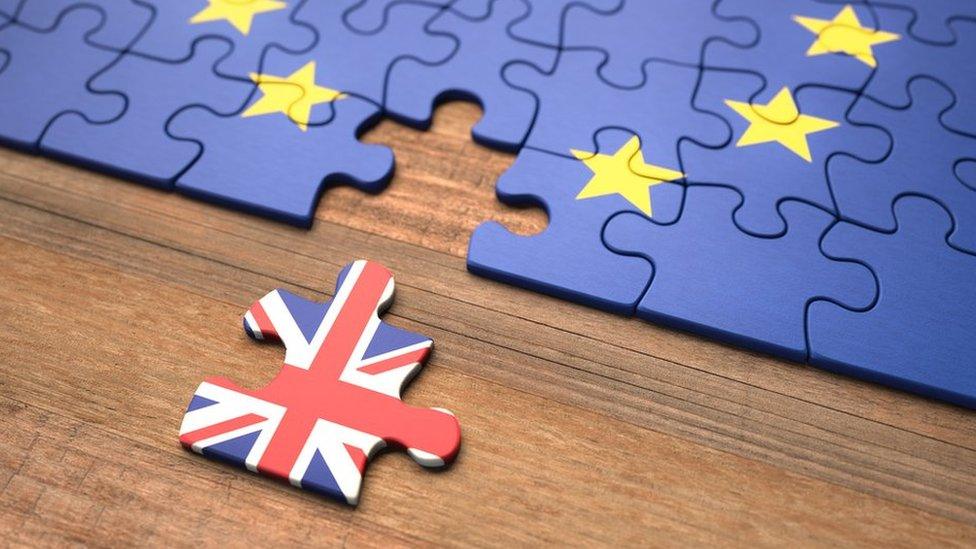Brexit: Edwin Poots warns of job losses and food shortages
- Published
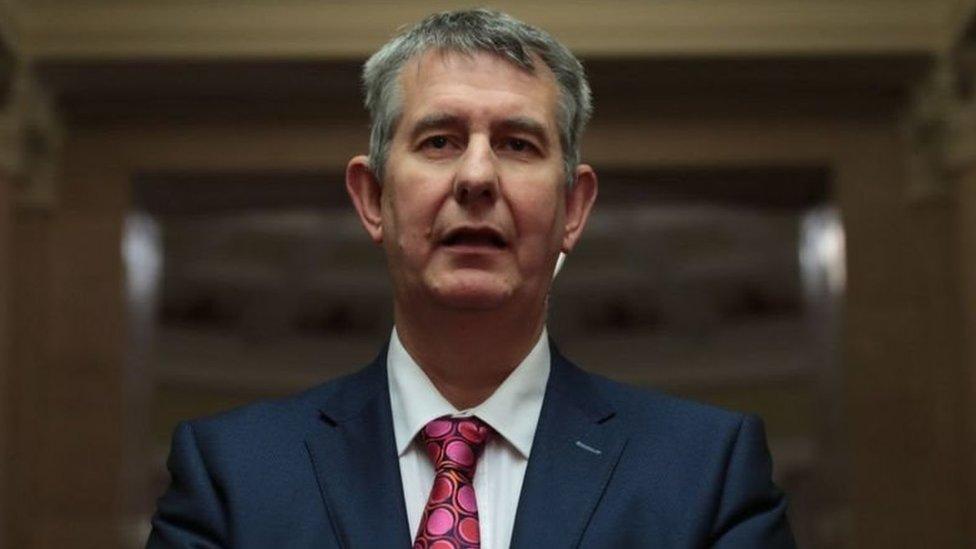
Edwin Poots said he has asked senior UK government figures to consider unilaterally revoking the NI Protocol
The Stormont minister whose officials are responsible for the new Irish Sea border has said some food will be unavailable if changes are not made.
DUP Agriculture Minister Edwin Poots has also said jobs could be at risk.
He said problems at the ports were being caused by new rules applied on imports of food and other products from Britain to Northern Ireland.
Earlier Cabinet Office Minister Michael Gove said trade from GB to NI "will get worse before it gets better".
Mr Gove said that "work is ongoing" and it is "all part of the process of leaving the European Union".
He added that he had spoken to ministers from all parties in the Northern Ireland Executive.
Trade disruption
After speaking with hauliers, supermarkets and processors this week, Mr Poots predicted the loss of jobs and rising costs.
"A wide range of frozen and chilled foods will be unavailable after the temporary exemption period ends," he tweeted.
Allow X content?
This article contains content provided by X. We ask for your permission before anything is loaded, as they may be using cookies and other technologies. You may want to read X’s cookie policy, external and privacy policy, external before accepting. To view this content choose ‘accept and continue’.

That exemption period applies to supermarkets and other food importers and runs out in April.
After that they will have to comply with all the paperwork required to ship food in, or find suppliers on the island of Ireland or elsewhere in the EU.
New rules - called the Northern Ireland Protocol - were introduced because while the UK has left the EU, Northern Ireland has remained in the Single Market for goods and is continuing to apply EU customs rules.
The arrangement was agreed between the UK and the EU to prevent a hard border on the island of Ireland.
Mr Poots said he had spoken to senior UK government figures to ask them to consider unilaterally revoking the protocol as it was "damaging Northern Ireland at the economic and societal level".
And he hit out at members of Sinn Fein, the SDLP, and Alliance Party who he claimed had supported it.
Members of those parties have countered similar claims from other DUP politicians in recent days.
They said DUP MPs had voted against alternative arrangements that would have been simpler to manage before the government pushed ahead with the protocol plan.
Responding to Mr Poot's tweet on Friday evening, SDLP leader Colum Eastwood wrote: "You broke it, you own it."
Allow X content?
This article contains content provided by X. We ask for your permission before anything is loaded, as they may be using cookies and other technologies. You may want to read X’s cookie policy, external and privacy policy, external before accepting. To view this content choose ‘accept and continue’.

Sinn Féin MLA Martina Anderson accused Mr Poots of being "asleep at the wheel".
Allow X content?
This article contains content provided by X. We ask for your permission before anything is loaded, as they may be using cookies and other technologies. You may want to read X’s cookie policy, external and privacy policy, external before accepting. To view this content choose ‘accept and continue’.

The Ulster Unionist Party (UUP) has called for the assembly to be recalled to discuss difficulties over trading between Great Britain and Northern Ireland due to Brexit.
The party has submitted a recall petition.
UUP MLA Roy Beggs said: "The impact of the Irish Sea border is causing horrendous difficulties for hauliers and this is being seen in shops and businesses across Northern Ireland.
"It is damaging the Northern Ireland economy and the situation is escalating."
'Ironing out issues'
Earlier on Friday, Michael Gove said it had been expected that there would be "some initial disruption" to trade between GB and NI, but that the government is "ironing" issues out.
He said discussions with the executive in Northern Ireland were "in order to make sure that the [Northern Ireland] protocol works".
"[To make sure] that businesses in Northern Ireland can continue to have access to the rest of the UK market, and that Northern Ireland businesses can have the goods that they need on the shelves, that they have access to at the moment," he said.
Northern Ireland has remained a part of the EU's single market for goods while the rest of the UK has left.
This means food products from Great Britain are subject to checks when they enter Northern Ireland.
Similar processes and checks also apply when moving food products from Great Britain into the Republic of Ireland.
Relaxing controls
Meanwhile, an organisation representing haulage firms has called on the UK and Irish government to relax some of the new Irish Sea trade border rules.
The Road Haulage Association (RHA) said there is serious disruption to freight movements into the island of Ireland.
The RHA said relaxing the controls on food products and customs declarations "would help traders to ship goods that have struggled to move over recent days."
"The problems have led to gaps in supermarket shelves and lorries delayed at ports because of problems with red-tape and the situation is worsening," the organisation added.
"We are facing an inflexible, cumbersome and time consuming process just to move goods."
The UK government said the flow of goods "between GB and NI has been smooth overall and arrivals of freight have continued to increase substantially over this week".
"There are no significant queues at NI ports and supermarkets are reporting healthy supplies into their Northern Ireland stores," a spokesperson added.
"We recognise the need to provide as much support to the haulage sector as possible as industry adapts to new processes. That's why hauliers can benefit from the Trader Support Service, which provides free advice and support to businesses of all sizes moving goods under the Northern Ireland Protocol.
"We have been engaging intensively with the Irish authorities and hauliers on the issues that have been encountered for goods transiting through Dublin port."
Relaxation
On Thursday customs authorities in the Republic of Ireland announced a temporary relaxation of one customs process.
Hauliers will be able to use an override code to complete a piece of administration known as ENS.
The letters ENS refer to an entry summary declaration, an online form which goods carriers are now legally obliged to submit to Irish customs when transporting goods from Great Britain into Ireland.
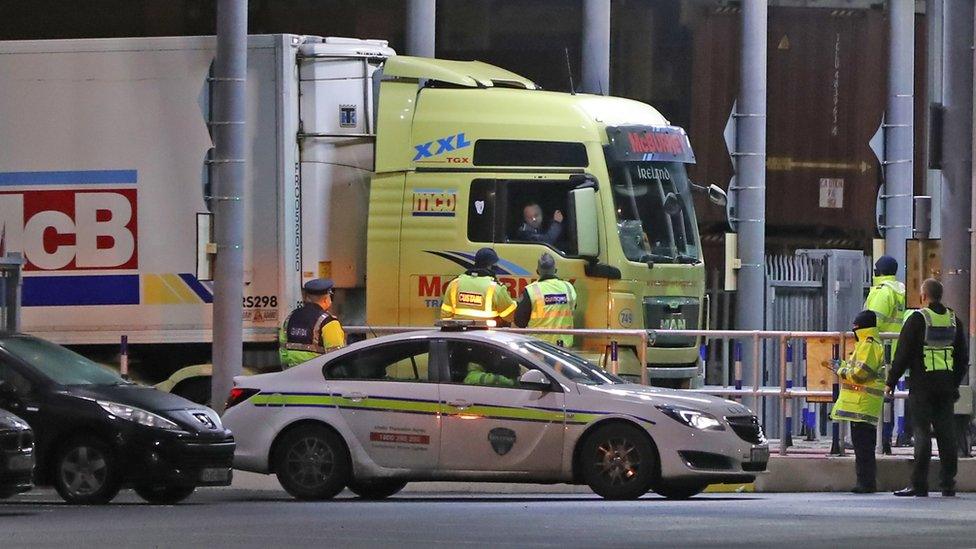
Lorries arriving in Ireland from Great Britain have faced new checks since 1 January
On Thursday night the Irish Revenue Commissioners said it recognised that "some businesses are experiencing difficulties on lodging their safety and security ENS declarations".
It said that in response it was providing a "temporary easement" which would allow an ENS to be produced without all the normally required information.
An Irish government spokesperson said it is "absolutely essential that Ireland fulfils its obligations as a member of the EU and that we protect the integrity of the single market and the customs union".
"We appreciate that the new requirements and customs formalities present significant challenges and impose additional burdens on businesses."
Meanwhile Stena, the ferry company, said it was cancelling a dozen sailings between Wales and Ireland next week due to "a decline in freight volumes during the first week of Brexit."
- Published7 January 2021
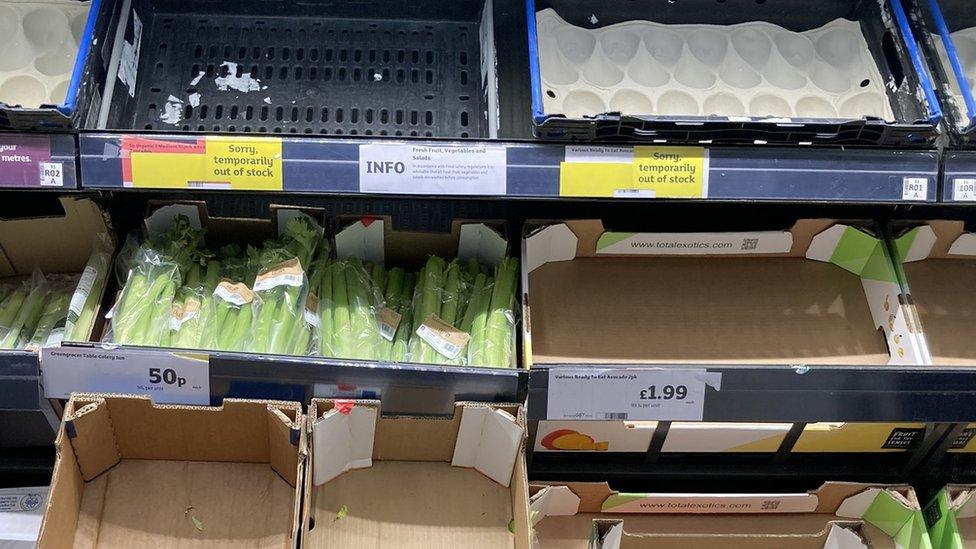
- Published23 December 2020
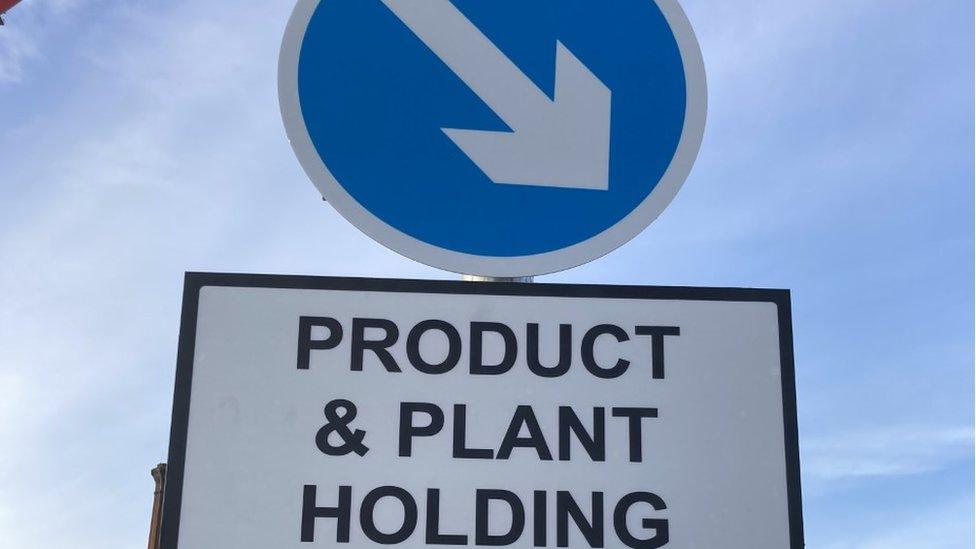
- Published24 December 2020
